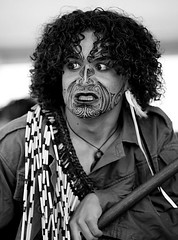| ASB Polyfest 2008 Avondale College Samoan Group (Photo credit: Richard Sihamau) |
The session was opened with a traditional Maori waiata being played of Whirimako Black singing E Kumara about sharing the goods, treasuring things important. Merryn then greeted everyone and shared some of the different ways of offering greetings in Maori and Pacific languages, and then offered the following whakatoki:
Na to rourou, na taku rourou ka ora ai te iwiA slide from Waikato University (2003) was introduced, that looked, from a Pakeha perspective, the Maori pedagogies. Other factors that were mentioned, including those on a diagram by Peta Sharples and his team.
With your food basket and my food basket the people will thrive
| ASB Polyfest 2008 Ruderford High Maori Group (Photo credit: Richard Sihamau) |
Heather started by speaking about one of the students with whom she is working, and spoke in particular about the content of this video. This student feels as though that her Maori language is her strength, and that by using the language was a way of showing respect, and by showing respect to her culture she indicated that you "show respect to me". Heather went on to describe the conversations that she has been having with colleagues, as well as (perhaps more importantly) the students. "It was like opening the floodgates...why haven't we been doing this all along? This is the way I can connect with my students." She also said that it pushed it out of her comfort zone as she was worried about causing offence, feeling inauthentic - especially with her Canadian accent, and other concerns. However, she persisted, and set herself the learning objective (that she shared with her students) "How do I incorporate Maori language into the classroom", and now she is finding that her students often support and guide her in her learning journey. She gave a lovely example of one student who created a PowerPoint with language she feels Heather should know! Heather is now finding that students are dropping in to her classroom and she is finding out more about their families, and feels that the response is because she is meeting them within their own culture. There was also an example about how a student has really started to engage since Heather has acknowledged him 'authentically', and he is now becoming more involved in class. There was some neat follow up discussion after Heather's contribution, especially around respect, and relationships.
A himene was played, and Merryn explained why it's culturally responsive to include such songs, and recognising the importance of protocols. Vicki mentioned that she has students other than Maori and Pasifika including "a Sri Lankan girl, a Hindi girl and another who is Jewish and Korean in descent. Provides lovely variety for the building of tolerance and understanding of others that are different".
Marg talked with enthusiasm about a range of amazing initiatives that she is working on with the students, school and community, and showed a prezi which illustrated many of things the students are doing at Ashburton college (with 1200 students where 6% are Pacific Islanders and 11% are Maori. They have one specialist ESOL teacher at the school and they are lobbying for more. They have a working group who are working toward providing support for the Pasifika students. Students are being encouraged to step into the leadership spaces - especially important where the community members work long hours, and awesome for the students who stepped up to take on the roles as cultural leaders. One example was where the students have created a homework space for the community to study after school, that is warm, dry and welcoming. At the cluster meetings they share data, ideas about the issues as they see them, and have conversations around how they can start to help each other outside the parameter of a single school. Marg described the excitement (and successes) at Polyfest 2012. There are some wonderful things also underway such as reading mentor groups, which are proving to be incredibly popular...and effective. The community supports the reading groups to provide food and reading materials.
It was wonderful to hear about the incredible initiatives that are coming from the heart; ideas, and strategies that encourage students to step up and be heard, who are shown respect, and who grow while leading and teaching - "to make change it has to be a tide rather than a wave" (Merryn). So who is also trialling such initiatives? Please share experiences and ideas.
You can access a copy of the recording of the session here, as well as Marg's Prezi here, and Heather's video here.










No comments:
Post a Comment